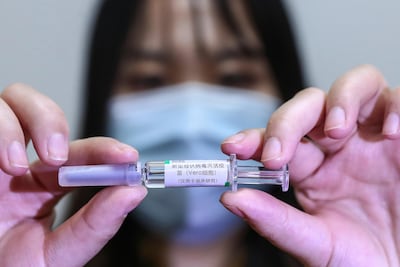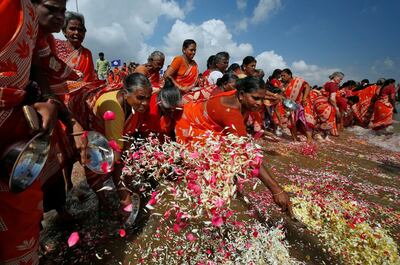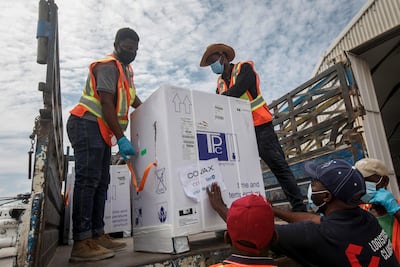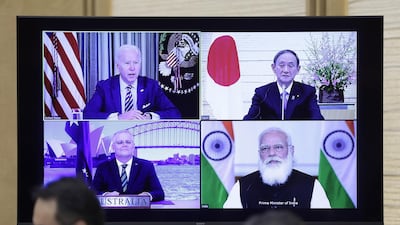Should swiftly vaccinating as many people as possible be an endeavour that brings us all together, around the world? Or is it in reality yet another arena for political one-upmanship and great power contestation?
China's President Xi Jinping was quite clear when he addressed the World Health Assembly in May last year. The vaccines China developed, he announced, would be a "global public good". Shortly before, one of the country's top virologists, Major General Chen Wei, said their efforts would be a "contribution to humankind".
Plenty have reason to be grateful for the results so far. According to officials, by the end of February China had provided free vaccines to 69 countries and was selling doses to 28 more. Serbia – with a population of seven million – had received one and a half million Sinopharm vaccines by the middle of that month, with more promised. The UAE, which tested Sinopharm and found it 86 per cent effective, started rolling out free inoculations to the public in December.
Closer to home, last year Chinese companies committed to supplying Indonesia with 250 million doses through 2021. Beijing took a clear early lead in manufacturing and distribution, with the added plus that all its vaccines can be stored in refrigerators, unlike those produced by Pfizer, which must be kept at between -80°C to -60°C.
With some notable exceptions, such as the UK, western countries were by contrast slow off the mark in placing orders for vaccines, quarrelled about who should get what once vaccines were available, and were accused of hoarding a surplus of doses sufficient to inoculate every adult in the whole of Africa. Under former president Donald Trump, the US stood alone and prevented international access to American-produced doses.
Some countries had reservations about the Chinese vaccines, but as Yanzhong Huang of the US Council on Foreign Relations wrote in a recent essay, America’s abdication of pandemic orchestration meant that “Beijing filled a leadership void that Washington left open".
Now there appears to be a political pushback. Although the International Olympic Committee has accepted China's offer to supply all participants in this summer's Tokyo games with vaccines, the Olympic Minister, Tamayo Marukawa, has said that Japanese athletes would not accept them. A polite explanation for this could be that Japan has very low rates of confidence in vaccines in general – under 30 per cent believe they are safe and effective, one survey found.

But Japan is also one of the four members of the "Quad" group, along with the US, India and Australia, which had its first ever heads of government meeting last week, at which they announced they would supply up to a billion vaccine doses across "the Indo-Pacific region" by the end of 2022.
These will be made in India and guided by a Quad Vaccine Experts Working Group that, as the countries' four leaders put it in an op-ed in The Washington Post, "brings together the sharpest scientific leaders from Australia, India, Japan and the United States to meet the region's pressing needs".
They listed potential partners in Asia and the Pacific, but there was no mention of co-operation with China; and given that the Quad's main purpose is to counter Beijing – without that ever being expressed quite so explicitly – the vaccine plan is naturally being seen as part of an effort to compete with and contain China. A benign take would be that the more doses produced, the better, but I do not think that making vaccination distribution a geopolitical contest is to be welcomed.

It didn’t have to be like this. The Quad, as its current leaders concede, has its roots in the four member countries coming together to respond to the 2004 tsunami that killed over 200,000 people and caused a humanitarian crisis in many Indian Ocean littoral states. After a long pause, it was “reborn in 2017” – but, as they don’t say, it was “reborn” as something quite different. It has since focused almost exclusively on security issues, and aims for a “free, open, resilient and inclusive… Indo-Pacific” in which “all countries are able to make their own political choices, free from coercion”.
“In recent years, that vision has increasingly been tested,” they say. The question “by whom?” needs no answer.
Many see the Quad being the core of an alliance of western-orientated democracies as problematic in itself. As a recent Carnegie Endowment for International Peace commentary points out: “If other countries in Asia view the Quad as little more than a talk shop to discuss the looming risks posed by China’s rise while occasionally holding joint military exercises, it is unlikely that other countries will see its utility or view it as a model for their own choices and conduct.”

But there is a wider point. The Quad’s current trajectory is a manifestation of a binary approach that is dialling up, not down, tensions in Asia. Another course was set out in an enlightened paper by the Quincy Institute for Responsible Statecraft this January, which called for “an inclusive, stable order in East Asia designed to manage shared, top-priority challenges such as climate change and pandemics”, in which “some initiatives should be jointly led by the United States and China… as a signal that the two sides are committed to working together to promote peace, stability and prosperity in Asia".
If working together to ensure all countries in the region receive full vaccine coverage isn’t a prime example of just such an initiative, I don’t know what is. This isn’t just a matter of how a fading superpower can rub along with a rising one, vital though that is. It is also that, to quote UN Secretary General Antonio Guterres: “At this critical moment, vaccine equity is the biggest moral test before the global community.”
So the Quad’s target of one billion vaccines is good news – but if, and only if, they are willing to work with everyone, including China, to make the region – and by extension the world – safe. As far as is possible, seeking geopolitical advantage should have no place in this time of pandemic.
Sholto Byrnes is an East Asian affairs columnist for The National


